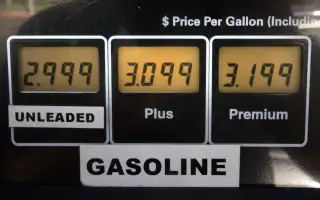$3 Gas, and Its Impact on What's Under the Christmas Tree

Not so fast.
Yes, gas prices have been plummeting in the U.S., bringing much-welcome relief to household budgets. Average prices around the country reached a new low for 2014 recently, and then just kept on falling, hitting a low not seen since 2010. As of Monday, according to AAA, the national average stood at $3.04 per gallon after falling 32 days in a row, making prices at the pump 25¢ cheaper compared to the same time one year ago. With prices falling roughly 1¢ per day (the average was down to $3.03 on Tuesday), we're on pace to reach the all-important psychological mark of $3 per gallon by the end of this week.
But let's step back. Is the $3 mark—and cheaper gas prices in general—really all that important for the economy as a whole?
A GasBuddy post crunched some numbers, and found that Americans are collectively saving $110 million per day on gas compared to what we spent a year ago. The timing of decreasing gas prices would seem to bode well for retailers, which are hoping that some of that money that's not being spent on gas will be spent instead on holiday purchases in the weeks ahead. Data from the research firm Deloitte indicates that retail holiday sales will rise 4% to 5% this year, or perhaps even higher considering that the average household could spend $260 less on gas for 2014 as a whole.
Retail analyst Mary Epner told CNBC recently that cheaper gas prices could wind up giving a boost to a few categories of retail in particular:
"A drop in gas prices should be great for Ross Stores, Walmart, and dollar stores (for consumers who must live paycheck to paycheck)," she said. "This also helps low-cost teen retailers, as most teens have a finite amount of money and they will usually opt to put gas in their cars before buying other things."
Overall, however, cheaper gas prices shouldn't necessarily be viewed as a holiday season savior for retail. As a recent Fortune post pointed out, gas prices had already begun their downward trajectory in September, but the month was basically a dud in terms of consumer spending. The effect of cheaper gas on holiday spending is expected to be minimal as well. At the higher end of the income spectrum, shoppers aren't going to alter holiday spending based on gas prices shifting by 10% or even 20%. For middle- and low-income earners, stagnant wages, weak hiring, and higher costs for housing and health care are likely to far outweigh any "savings" that come via cheaper gas prices.
What's more, as a Bloomberg News story noted, today's shoppers have grown so accustomed to huge discounts that they're programmed to ignore all but the most dramatic price slashings and promotions. Add in that over the past few years, drivers have seen gas prices retreat, rise, then retreat and rise again, so there's an appropriate level of skepticism concerning the idea that we could be paying less for gas for the long haul.
Few people will head promptly to the mall and splurge because the price of a gallon of gas drops by a few pennies. Nor should they.